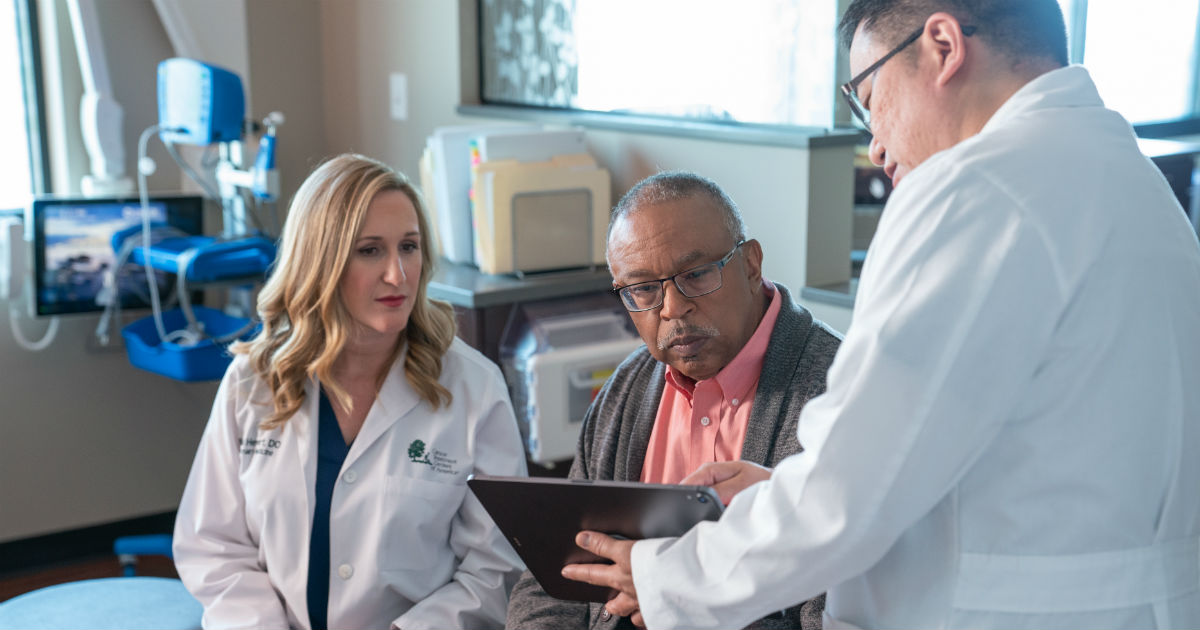
Lung cancer experts Dr. Bruce Gershenhorn and Dr. Jonathan Kiev took time out of their schedules last week to answer your questions during our Lung Cancer Facebook Chat. Lung cancer is the second most common non-skin cancer among American men and women, and we know there are many questions about the disease, from how it develops to how it’s treated.
We’ve outlined below some of the conversation that took place on Facebook. Take a moment to read the transcript, and share any additional questions you may have in the comments section of this blog post. Dr. Gershenhorn and Dr. Kiev will do their best to answer those, too.
Q: Should someone diagnosed with lung cancer seek a second opinion? Is there a genetic predisposition for lung cancer? What can we do to end the stigma that lung cancer is a smoker’s disease? – Mesothelioma Cancer Alliance
A: A second opinion never hurts. You owe it to yourself to make sure you are well informed. There are no well described common genetic syndromes that predispose people to lung cancer. The more we continue to talk about lung cancer—its causes, treatments, etc.—the more awareness we will generate. – Drs. G & K
Q: Are all nodules found on one’s lung/lungs always cancerous? – Deborah
A: No. The majority are not cancerous. If a nodule is found, be sure to follow up with a lung expert. You can learn more about how we diagnose spots on the lung through the program at our hospital near Chicago. – Dr. K
Q: What are the signs of having lung cancer? – Terri
A: Cough, shortness of breath, coughing up blood, weight loss, fatigue. However, the majority of patients have no symptoms, which is why screening in high-risk individuals is so important. – Dr. K
Q: What kind of innovation is taking place in the lung cancer space? – Brooke
A: Lung cancer is moving in two different directions: targeted therapies and immune-stimulating therapies. Targeted therapies pair drugs with specific driver mutations in an individual’s cancer. Immune-stimulating therapies harness the power of the immune system to directly kill the cancer cells. There are multiple agents currently available, and in testing, that exploit these two different approaches. – Drs. G & K
Q: What have you heard helps people coping with the withdrawal of quitting smoking? – Felicia
A: A good smoking cessation program and a good support system are key elements in the fight against nicotine addiction. – Dr. K
Q: I have always heard lung cancer is from smoking. What about those who never smoked? – Connie
A: Lung cancer does develop in non-smokers, about 10 percent of them. Other causes include asbestos, radon and other environmental exposures. Non-smokers have a higher incidence of mutations that are targetable with pills vs. traditional chemotherapy. – Dr. G & Dr. K
Q: I would like to know if the doctors have used Nivolumab. – Renee
A: Yes. Right now it is FDA-approved only for squamous cell lung cancer. I’m extremely excited for the potential of this drug. – Dr. G
Q: What is the likelihood of developing lung cancer when a carcinoid tumorlet is removed? – Pam
A: Very unlikely, but you need to be followed very closely by pulmonary experts. – Dr. K
Q: Does chronic obstructive pulmonary disease (COPD) directly lead to lung cancer? – Melody
A: The same risk factor that causes COPD also causes lung cancer—smoking. Therefore, patients with COPD have a much higher risk for developing lung cancer. – Dr. G
Q: My sister has stage IV lung cancer with six metastases in her brain, and the cancer is in several areas of her body. Is she or would she ever be a candidate for the immunotherapy or other targeted therapies, or do they only work if the cancer is isolated? – Regina
A: Right now immunotherapies are only approved for squamous cell lung cancer. However, this is likely to change in the near future. Targeted therapies must be paired specifically to a patient’s cancer characteristics. – Dr. G
Q: I lost my grandpa, a few cousins and several of my aunts and uncles to lung cancer. My mom had breast cancer. I had pre-cervical cancer when I was 16. My sisters also have had different types of cancers. This being said, why is it they say cancer isn't hereditary? – Theresa
A: Theresa, this is a complicated question. We would recommend an evaluation by a genetic counselor to better understand you and your family’s risk. You can learn more about genetic counseling, including the psychological benefits and risks involved. – Drs. G & K
Q: Both of my parents had lung cancer. I am 52 years old and a former smoker. What do lung scans offer? – Tracey
A: Screening CT lung scans offer the opportunity to detect lung cancer early on, which can improve treatment outcomes. – Dr. K
Q: What is the difference between genetic and genomic testing? – Suzanne
A: Think of genomic testing as taking the tumor itself and understanding what is driving it, why the cell became cancerous. Genomic testing allows you to call it by its unique engine, its molecular driver. You can then target the cancer based on that molecular engine. Genetic testing is more about understanding what your parents gave you and what has been passed down to your children. As far as genetic testing relates to lung cancer, research is ongoing. – Drs. K & G
Learn more about lung cancer, including how it's diagnosed and treated.

